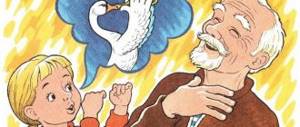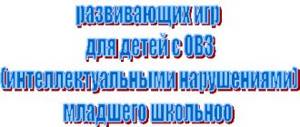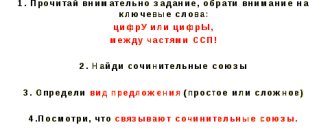Self-analysis of a Russian lesson, grade 5, type VIII correctional school
Self-analysis of the Russian language lesson conducted by Skokova S.A.
The Russian language lesson was held in 5th grade according to calendar and thematic planning. The topic of the lesson is “Noun. Grammatical features of a noun, consolidation."
. To study the topic in the course of teaching the “Russian language” in grade 5 according to the program edited by V.V. Voronkova is given 11 lessons. This lesson is 8.
The purpose of this lesson is to: generalize and consolidate children's knowledge about such grammatical features of nouns as proper and common nouns, the number of nouns, animate and inanimate nouns, gender of nouns.
Tasks:
Educational: to develop the ability to apply in practice knowledge about the grammatical features of a noun as a part of speech, to develop students’ oral and written speech. · Ability to work on self-esteem and adequate understanding of the reasons for success/failure in educational activities;
- the ability to demonstrate independence in various types of activities.
- understanding the richness and diversity of linguistic means for expressing thoughts and feelings;
Educational:
1. Develop accuracy and literacy when writing.
2. Expand the active vocabulary.
3. Develop students' oral and written speech.
Educational: to cultivate interest, love for the native language, positive motivation for learning, diligence.
Equipment:
The use of modern educational technologies - problem-dialogical technology, ICT, health-saving technology (motor physical exercises, dosage of tasks, timely change of activities of students, sanpin), workbooks, textbook for special (correctional) educational institutions "Russian language" 5th grade, edited N.G. Galunchikova, E.V. Yakubovskaya.
By type of lesson, this is a lesson in the integrated application of knowledge and skills (a lesson in consolidation) based on a systematic activity approach. In accordance with the topic of the lesson, purpose and objectives, forms of organizing educational work were chosen: individual, group, pair, frontal, differentiated. Equipment was also used: computer, projector, handouts.
During the lesson, the age and psychological characteristics of the students were taken into account.
I built my lesson in accordance with the program, using information and communication technologies. At all stages of the lesson, students were involved in active mental and practical activities of a research nature; children had to not only use existing knowledge, but also find a new way to perform an action they already knew. The stages of the lesson were closely interconnected, various types of activities alternated. Mental actions were based and supported by practical ones. Throughout the lesson, the educational material worked to organize a feasible search for fifth-graders and corresponded to their life experience. Each stage of the lesson was aimed at achieving a certain result.
The lesson material complied with the principle of accessibility and was suitable for fifth grade students. The educational information was attractive to the children. Due to this content of assignments and the presentation of educational material, the students’ abilities to achieve their goals in the lesson have increased.
Study time in the lesson was used effectively, the planned volume of the lesson was completed. The intensity of the lesson was optimal, taking into account the physical and psychological characteristics of the students.
Thus, solving the problems of the lesson contributed to the achievement of its goal.
Organization of self-training in a correctional school - recommendations for the teacher
Self-training in a correctional school
The goal of self-preparation is to develop in children the skills and abilities to study independently, creating conditions for consolidating the material covered in class.
The most important aspect of self-training is the achievement of correctional educational tasks. First of all, we are talking about the formation of general activity skills.
Analysis of problem conditions, identification of ways to solve it.
The child's planning of his activities.
Control over your activities, evaluation of the final result.
The effectiveness of self-training is achieved subject to certain conditions:
The relationship between teachers, that is, the work between the teacher and the educator, must be established and systematized.
Homework must be dosed correctly.
A prerequisite is differentiation of homework, we must not forget to use technologies for different levels of learning, and be sure to distribute homework among groups of children.
Self-preparation should have the following structure:
Organizational moment - the teacher sets the children up for work
Didactic game for elementary school
Working with a diary. The teacher must teach children to work with a diary; it is important to constantly check the entries in the diaries and observe the child’s ability to find homework. The teacher-educator relationship notebook should be kept out of the reach of children.
At this stage, it is important to teach the child the rational sequence of completing tasks, as well as planning the distribution of time. That is, it is important to indicate which subject it is better to start doing homework with and which one to finish it with.
Children doing homework independently - at this stage, the teacher should, as easily as possible, allow children to do homework themselves. The teacher does not analyze the work, does not check the completed task, does not explain the topic of the last lesson - all this is the teacher’s job. The teacher must develop in the child the ability to work independently and, of course, create conditions for homework to be done efficiently.
But here the principle of multi-level learning is not canceled, if in a group there is a clear division of children into those who easily master the program and those who find it more difficult, the teacher must teach strong children the algorithm for completing homework and with those who are weaker in understanding the conditions of the task or exercise .
Orientation in homework is to teach children to work according to the algorithm:
read the task, understand what needs to be done to complete it;
repeat the rule that this homework is aimed at;
Self-study notes for 8th grade boarding school of VIII type
Summary of self-study in 8th grade.
Target:
formation of purposeful skills of independent activity, consolidation of knowledge acquired in the lesson.
Tasks:
Correctional and educational:
— learn to independently navigate the conditions of homework (what topic is assigned, how it is completed); develop an understanding of the need to check your work, self-testing and self-control skills.
Correctional and developmental:
— develop students’ thinking, attention, and memory through didactic exercises and additional tasks; develop fine motor skills and motor activity through dynamic breaks in order to increase the performance of pupils.
Correctional and educational:
- cultivate a conscientious attitude towards academic work, discipline.
Equipment:
textbooks, individual notebooks, task cards, books for additional reading, multimedia board, laptop.
Progress of self-preparation.
I. _ Organizing time.
— Please stand up, let's greet the school teachers.
(Hello! Good afternoon!)
Preparation of the workplace. (
children checking the availability of school supplies, their location on the table)
— It's time to start doing your homework. Look at me, smile, get ready to work. I ask you to check whether you have prepared your work area well. Whoever has his desk in order and has everything he needs for work can sit down.
—
Guys! We have guests today. They came to get to know you better. Therefore, you must show your knowledge and try to be attentive, friendly and well-mannered hosts.
On the board there is a phrase: “The guest does not stay long, but notices a lot.”
(slide 2)
— To what genre of folk art can we classify it? (proverb)
- How do you understand its meaning? (children's answers)
II . Setting goals.
— Tell me, what task is facing you in self-training? (students' answers)
— Reinforce the material you learned in class.
Now, let's repeat the rules that will help us in our work: (slide 3)
- Get down to business - don’t get distracted, don’t disturb others.
- Do everything quickly and carefully.
- Let them know in a timely manner that you need help.
- Don't shout out, raise your hand.
III . Planning work, working with a diary.
— We opened the diaries.
— What subjects do you have homework for? ( Mathematics, Russian language.
)
The first subject in which we will complete the task is mathematics.
— What topic did you study in class today? (finding the arithmetic mean)
— Repetition of the rule for finding the arithmetic mean. (slide4)
— Solving the problem of consolidating the rule. (slide 5)
— What do you need to know well in order to solve examples correctly? ( Multiplication table.
)
Let's repeat the multiplication table.
Game "Unscramble the Word"
(slide 6)
Keyword : ATTENTION
— Do you think this quality is necessary for our work?
Now, we will perform exercises that will prepare your body for hard work.
Exercises to activate attention.
- Sit back in your chair, rub your ears thoroughly, first only the lobes, and then the entire ear, using your palms. (15-20 sec.)
- Shaking your head. Drop your head forward and slowly rock from side to side.
Educator: Please open your mathematics textbook.
Page_______, No._______. Find the task you've been assigned? Instructions for completing the task.
Educator: - How will we format our work in a notebook?
(From class work, step back four cells down and write “Homework”, below the word “Examples”, between the columns - 3 cells.)
— Guys, do you have any questions about doing your math homework? If anyone has any difficulties during the work process, raise your hand and I will help.
Whoever finishes homework earlier will receive additional assignments.
Fizminutka
(slide 7)
V. _ Doing homework in Russian.
Game "Eliminate the Unnecessary"
(slide 8-9)
Goal: development of logical thinking, motivation of activity.
Noun, verb, root
, adjective;
Prefix, root, suffix, predicate
;
Subject, predicate, noun
, homogeneous members of the sentence;
Night, forest, table, beautiful
, autumn;
Warm, green, running
, funny;
Moscow,
desk, diary, chalk.
— What homework is assigned in Russian?
House. assignment page ______, exercise no. _____
Vocabulary work:
doomed to immobility, canvases, fair, painter.
(slide10)
Please open your textbooks. Read the exercise and its assignment.
— Who is the exercise talking about? (about the artist B.M. Kustodiev) (slide 11)
- Let's look at a number of examples.
Individual work: _______________________________________
— How will we format the work in the notebook?
(From the class work we retreat down 2 lines, write “Homework”, below we write “Exercise” and then complete the task)
— If you have no questions about doing your homework, then you can start working. You have 10-12 minutes.
GYMNASTICS FOR THE EYES
After completing a written assignment, do gymnastics to relieve eye strain. (Bazarny visual simulator)
VI . Self-test.
To make sure that the task was completed correctly, you need to do a check.
VIII . Introspection.
Reflection: “Evaluate your work.” (slide12)
— And now, guys, each of you will evaluate your work and answer the question “Am I satisfied with my work today?”
IX . Bottom line.
— We put things in order at our workplaces. Tell me, have we accomplished everything we planned? ( Yes.
)
— Did you do a good job or not? ( Fine!
) (attention to the board)
— And if you look at the mugs you chose, you are satisfied with today’s work. Well done! I'm happy with you!
The lesson is over.
Thanks everyone for your work!
Self-analysis “Self-training in a correctional school”
Self-analysis
of open self-preparation
grades 4 – 7
Conducted by teacher: Kufiakova Elena Aleksandrovna
There are 9 boys in the group. Two of them are studying in 7th grade, 7 people are in 4th grade. Four children from grade 4 in terms of development level were assigned to group 2 (Tolya B., Dima U., Ivan G. Islam, in mathematics); three children - to group 1 (Alyosha S., Alyosha I., Vadim P.)
The main goal of self-training:
— formation of children’s skills and abilities of independent activity.
— repetition and consolidation of the material studied in the lesson;
Tasks:
- develop cognitive abilities
- promote the correction of all thought processes
At the preparatory stage, I checked the sanitary condition of the classroom and ventilated it. For work, I prepared visual material: cards with multiplication tables, cards with cases and case questions, cards with crossword puzzles.
Org. moment - combined both in poetic form and in prose, emphasized the readiness of children (at their desks) for self-preparation. She asked the children to remember the “3 Self” rule. I played a game to develop attention called “Snake”. The children coped with the game mostly successfully.
For the success of completing homework, it was differentiated: in mathematics, Tolya B. completed the task on a card prepared by the teacher, Vanya G. solved a reduced volume of examples because he counts not bad, but very slowly (the volume for Ivan is determined by the teacher). The rest of the guys completed the task in full. The pace of execution was set individually, but within the allotted time. Before doing homework in mathematics, we repeated Table X in a differentiated manner; children of 4th grade are within 5, and children of 7th grade are 8, 9.
For those guys who completed the task earlier, entertaining crossword puzzles were prepared.
While working on the reading task, I used an exercise to develop the pace of reading. Emphasized reading whole words (for 4th grade). The 7th grade children were given more independence so that the children learned to plan their activities, were able to control themselves during the activity and evaluate its final result.
Next, I carried out a physical examination. a moment in poetic form.
During self-training, I implemented tasks such as:
- ability to navigate a learning task;
- read the task before starting to complete it, determine the method of execution;
- use reference material (rules, samples of task completion, cards with tables);
- contact the teacher for help in case of difficulties;
— plan your activities, rationally use the time allotted for self-preparation;
- independently check the work performed.
In addition to these tasks, I also solved traditional educational tasks:
— fostering a responsible attitude to academic work, activity, perseverance, willingness to help a friend, the ability to work without disturbing others, discipline, organization, attentiveness, etc.
For more successful self-preparation, I complied with a number of requirements:
— relationship in working with teachers;
— compliance with the protective pedagogical regime;
- correct dosage of homework;
— a differentiated approach when determining homework.
At the final stage, I prepared a surprise moment as part of the self-assessment. She summed it up and thanked the guys for their work.
Everything planned was accomplished.


